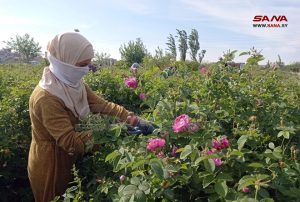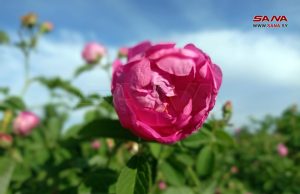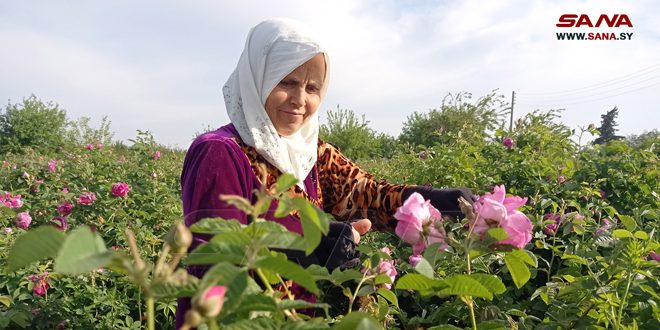Aleppo, (ST) – The Harvesting of the Damascene Rose has begun in the village of Al-Nairab in Aleppo.
“The Damaacene rose is rooted in our culture and we intrested in planting it and taking care of it just as we care about our children,” the Farmer, Abdul Ghani Suleiman, 70 years old, who owns a field of roses with an area of up to five dunams, said in a statement to SANA’s correspondent in Aleppo:
Suleiman stated that this season was good due to the continuous care for the rose bushes, including watering, fertilizing, and pruning. He and his family come early in the morning to pick roses and then market the crop.
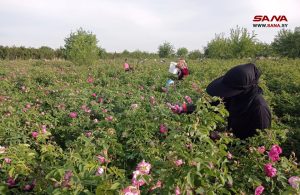 Farmer Khaled Suleiman, who owns an area of three dunums planted with the Damascene rose, explained that he continuously take care of his field, including plowing, fertilizing, watering, and treating tha plants from diseases. During the harvest season, he makes sure to come early and harvest the crop every day, reviewing the great nutritional benefits of the roses and their many products, including making juices, jams, and perfumes.
Farmer Khaled Suleiman, who owns an area of three dunums planted with the Damascene rose, explained that he continuously take care of his field, including plowing, fertilizing, watering, and treating tha plants from diseases. During the harvest season, he makes sure to come early and harvest the crop every day, reviewing the great nutritional benefits of the roses and their many products, including making juices, jams, and perfumes.
Farmer Mahmoud Sharfo, who owns an area of 17 dunums planted with the Damascene rose, said that he inherited this land from his grandfathers, pointing out that he provides the roses with all the care they need and continues to plant more of them.
He called on the concerned authorities to provide assistance in the form of fertilizers and fuel.
 The Head of the Damascene Rose Production Association, Mahmoud Sharafo spoke about the ritual of harvesting the Damascene rose, which lasts for a short period during the month of May, where people gather before sunrise in the fields and begin the harvesting process.
The Head of the Damascene Rose Production Association, Mahmoud Sharafo spoke about the ritual of harvesting the Damascene rose, which lasts for a short period during the month of May, where people gather before sunrise in the fields and begin the harvesting process.
He pointed to the importance of the Damascene rose in the manufacture medicines, juice, jams, and cosmetics.
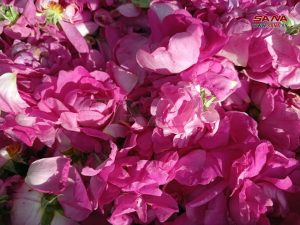 Aleppo Agriculture Director, Eng. Radwan Harsouni said: The areas cultivated with the Damascene rose amounted to 30 hectares in Aleppo, including 23 hectares in the village of Al-Nayrab. He pointed out that the directorate worked to organize guidance seminars for farmers on how to take care of the Damascene rose, in addition to the work of the General Authority for Scientific Agricultural Research to produce new strains of roses that are resistant to diseases and agricultural pests, new shrubs are also produced in the agricultural nursery and distributed to farmers at promotional prices.
Aleppo Agriculture Director, Eng. Radwan Harsouni said: The areas cultivated with the Damascene rose amounted to 30 hectares in Aleppo, including 23 hectares in the village of Al-Nayrab. He pointed out that the directorate worked to organize guidance seminars for farmers on how to take care of the Damascene rose, in addition to the work of the General Authority for Scientific Agricultural Research to produce new strains of roses that are resistant to diseases and agricultural pests, new shrubs are also produced in the agricultural nursery and distributed to farmers at promotional prices.
Raghda Sawas
